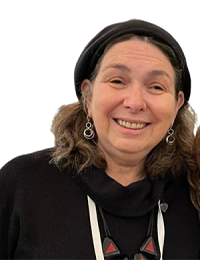Robin B. Zeiger
Credentials
Finances
- 14 Yaakov Mozar
- Tel Aviv
- Mishol Hagivah
- Kfar HaRoe
Robin B. Zeiger
 Verified
Verified
Credentials
Clinical Psychologist, Jungian Analyst, Sandplay Therapist
PhD
Finances
350-500 NIS
None
Free Consultation
- 14 Yaakov Mozar
- Tel Aviv
- Mishol Hagivah
- Kfar HaRoe
ABOUT THE THERAPIST
I am a clinical psychologist and Jungian analyst in practice since 1985 practicing psychotherapy. With deep humility I am honored to escort my patients on a personal journey of individuation. Carl Jung brought to the world a deep respect for the Soul to grow and heal given the right environment. I partner with my patients to create a safe temenos (sacred place of therapy) for this deep work. I have worked with a breadth of problems including depression, anxiety, abuse, ADHD, trauma, life issues, and spirituality. I work extensively with dreams and symbolic work. I am impassioned to teach and train the next generation of therapists. As an active member of the Israel Institute for Jungian Psychology in Honor of Erich Neumann, I train analytic candidates. I teach Jungian psychotherapy at Bar Ilan’s program of Continuing Education. I am President of the Israeli Sandplay Therapists Association and a member of the International Society for Sandplay Therapists. I publish and present professional papers both in Israel and internationally, as well as author a blog for Medium.com for layfolk.
QUALIFICATIONS
PhD
University of Illinois at Chicago
1985
Degree
PhDEducation
University of Illinois at ChicagoYear of Graduation
1985Years in Practice
38
Mumche Category
Clinical Psychologist
Mumche License Number
27-30030
ADDITIONAL CREDENTIALS
Jungian psychodynamic/depth psychology, Israeli and International Sandplay Association
Training Interpersonal, Sandplay, Dream Analysis
Symbolic Work
Jungian Analyst 2018
DISTANCE COUNSELING
None
BLOG POSTS

Good Therapy is a Change in Scenery: Insights from the Other Side of the World
Every once in a while, important insights for my known world reveal themselves from the most unusual of places. My recent trip to the Far East: Myanmar and Thailand gifted me new insights and inspirations as a Jungian analyst. My mantra became, Good therapy is a chan...

Simmering Soup: On the Importance of Asking Questions
Sometimes the question sits on the back burner like low-simmering stew that has all but been forgotten. An innocent question may ignite a fire in a chilly room and we are off in a new direction. Or sometimes it buzzes around like a nasty mosquito.
.png)
Chewbacca Visits: The Power of a Dream
Dreams bring images and messages from the depths of our soul. It is our psyche’s way of compensating for our conscious life, which is only one-half of our life-story. Our dream life brings a richness and ebb and flow to our daily existence. Likewise when we are ...
PRIMARY SPECIALTIES
Anxiety / Panic
Depression
Infertility
Spiritual Concerns
Dreams/symbolic
ADDITIONAL SPECIALTIES
Abuse
Academic
Adjustments
Attention Deficit Hyperactivity Disorder (ADHD)
Executive / Career / Life Coaching
Grief
Holistic
Life Transitions
Parenting Issues / Training
Postpartum Depression
Self-Esteem
Trauma / Post Traumatic Stress Disorder PTSD
Vocational Counseling
CLIENT FOCUS
Population
Adults
Men
Women
Languages Spoken
English
TREATMENT APPROACH
Art TherapyArt therapy has clients express themselves through creative mediums such as drawing, painting, collage, coloring, or sculpting. Clients can interpret their subconscious world that is expressed in their art which could lead to a better understanding of their feelings and behavior. Artistic talent is not a prerequisite for art therapy as it’s not as much about the end result as much as it is about the process. The therapist looks for meaning in the creative choices of the work and the clients’ inner world. This therapeutic method enables clients to express their inner thoughts and feelings through creative expression rather than just talking about them.
Body-Mind PsychotherapyBody-mind psychotherapy is an integrative approach to psychological treatment that draws from both psychotherapeutic and somatic/body-based approaches. It emphasizes the interconnection between physical, emotional, cognitive and spiritual aspects of being. This approach seeks to help individuals explore how physical sensations, emotions, thoughts and beliefs influence their behavior and well-being. Through this exploration, individuals can gain insight into how the body and mind interact to create patterns of behavior, and how those patterns can be changed to promote healing and wellness.
DreamworkModern dreamwork asserts that the only person that can make meaning of their dream is the dreamer, which is what separates dreamwork from dream interpretation. In dreamwork, the practitioner is a guide in the exploration of the dream, with the client making meaning of the dream for themselves. The reason the practitioner is only a guide is because thoughts, emotions, as well as meaning of symbols are deeply personal and subjective. Dreams can be used to uncover hidden feelings and beliefs, develop self-awareness, and gain insight into problems and potential solutions. Dreamwork is often paired with other therapeutic modalities.
Expressive Arts TherapyExpressive Arts Therapy is particularly beneficial for clients who struggle with describing what they are feeling verbally. Through imagination and creation of different art forms, clients are able to interpret and communicate their inner world and catalyze healing. Expressive arts therapy can involve the use of multiple modalities, such as visual arts, music, movement, drama, storytelling, poetry, and play. It is used to help individuals of all ages, including children and adults, to explore their feelings, reconcile emotional conflicts, foster self-awareness, manage behavior and addictions, develop social skills, improve reality orientation, and solve problems.
Interpersonal Psychotherapy (IPT)IPT focuses on the relationships and interactions an individual has with others. It is based on the premise that the way that we interact with others can have a significant impact on our emotional well-being. During IPT sessions, the practitioner will work with the client to identify patterns of behavior and communication that may be contributing to their emotional distress. They will then help the client learn new ways of interacting with others, as well as teach them coping skills to manage difficult emotions. It is a time-limited therapy, typically lasting between 12-16 weeks, with the goal of helping the client develop long-term coping skills.
Jungian PsychotherapyJungian Psychotherapy is based on the theories of Swiss psychiatrist Carl Jung. It focuses on helping individuals to understand and explore their inner self, and to discover the psychological dynamics that underlie their behaviors, thoughts, and feelings. This type of psychotherapy encourages individuals to become more aware of their own inner experience and how it affects their life and relationships. Jungian Psychotherapy also focuses on understanding the symbolic meanings of dreams, and how the unconscious mind influences behavior. Through exploring dreams, symbols, and other unconscious material, practitioners serve as guides to help clients identify patterns and themes that may be impacting their current behaviors and thoughts. It is an effective treatment for a variety of mental health issues, including depression, anxiety, and trauma.
Psychodynamic TherapyPsychodynamic therapy is a form of therapy that focuses on the unconscious mind and how it affects behavior. It works to help people understand and work through past experiences and feelings that may be causing difficulties in the present. This type of therapy encourages individuals to explore their emotions, relationships, and behaviors in order to gain insight into their current difficulties. It can help individuals better understand themselves and their motivations, and gain insight into how past events have impacted their current lives. People tend to develop defense mechanisms when faced with challenges in life. Defense mechanisms may keep painful feelings, memories, and experiences in the unconscious. A few common defense mechanisms include: denial, repression, and rationalization. Psychodynamic therapists encourage people to speak freely about their emotions, desires, and fears. Being open may help uncover vulnerable feelings that have been pushed out of conscious awareness. According to psychodynamic theory, behavior is influenced by unconscious thought. Once painful feelings are brought forth and processed, the defense mechanisms are no longer needed and a person in treatment can start changing unhelpful patterns when coping with life’s challenges.
Relational PsychotherapyRelational psychotherapy is a form of psychotherapy that focuses on a person’s relationships with others and the dynamics between them. It emphasizes the importance of the therapeutic relationship between the client and the therapist, and it explores the meaning and purpose of relationships in the client’s life. Relational psychotherapy seeks to understand how the client’s past relationships shape their current experiences and how the client interacts with others. The goal is to help the person develop healthier relationships and better communication skills so they can become more emotionally connected to others.
Sandplay, Depth Psychology
SERVICES OFFERED
Individual Therapy
Clinical Supervision
Coaching

BLOG POSTS

Good Therapy is a Change in Scenery: Insights from the Other Side of the World
Every once in a while, important insights for my known world reveal themselves from the most unusual of places. My recent trip to the Far East: Myanmar and Thailand gifted me new insights and inspirations as a Jungian analyst. My mantra became, Good therapy is a chan...

Simmering Soup: On the Importance of Asking Questions
Sometimes the question sits on the back burner like low-simmering stew that has all but been forgotten. An innocent question may ignite a fire in a chilly room and we are off in a new direction. Or sometimes it buzzes around like a nasty mosquito.
.png)
Chewbacca Visits: The Power of a Dream
Dreams bring images and messages from the depths of our soul. It is our psyche’s way of compensating for our conscious life, which is only one-half of our life-story. Our dream life brings a richness and ebb and flow to our daily existence. Likewise when we are ...

 Verified
Verified

